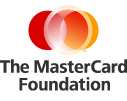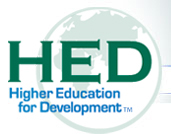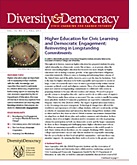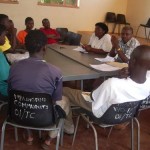November 2011 Newsletter
 |
|
| 7 November 2011 |
The Talloires Network E-Newsletter |
|
In This Issue
Members To see a full list of our 228 member institutions, Not a member of the Talloires Network? Learn how to JOIN NOW>>
Talloires Website Remember to visit our website! Google Map showing our member universities
About the Talloires Network Tufts University and Innovations in Civic Participation serve as the Secretariat of the Talloires Network.
Contact Us Rob Hollister Steering Committee members Mark Gearan (Chair) Janice Reid (Vice-Chair) Lisa Anderson Scott Cowen Sharifah Hapsah Shahabudin Shamsh Kassim-Lakha Olive Mugenda José María Sanz Martínez Jerome Slamat Rafael Velasco John Wood |
Update from the Chair: President Mark Gearan This issue was a frequent topic at our recent conference in Madrid and is raised regularly in other discussions. Most recently, Rector Ignacio Sanchez and his colleagues at the Pontifical Catholic University of Chile recommended to Rob Hollister in his meetings in Santiago that the Network take action to advance impact measurement. I strongly support this initiative. The engaged university movement often is held back by the lack of credible and practical information about what our programs are actually accomplishing. This is a promising opportunity for collective action – to learn from each other’s experience and to work together to develop and test new tools. As the group makes progress, it will share its work-in-progress with our full membership. Update: Talloires Network Youth Economic Participation Initiative A planning process is currently underway to design the initiative in collaboration with a wide range of stakeholders. During the past few months, we have worked with colleagues at the youth consultant group DECODE to conduct youth outreach through peer-to-peer interviews in ten countries, organized a dynamic global advisory committee, and initiated an online learning community composed of professionals working on programs that aim to bridge the gap between higher education and employment. The online learning community began on November 7 and will run for six weeks. We can accommodate a few more participants, so please contact Jennifer Catalano at jennifer.catalano@tufts.edu if you or your colleagues are interested in joining the conversation. RFP: "Pathways to Cleaner Production" Jenzabar Foundation Grants Diversity and Democracy, Vol 14 No 3 (Fall 2011). "Higher Education for Civic Learning and Democratic Engagement: Reinvesting in Longstanding Commitments." For a complete list of upcoming events, visit our website>> Service-Learning Director Leadership Institute, Roanoke, Virginia (USA), 28 February – 1 March 2012 Clinton Global Initiative-University 2012 Conference. Washington, DC, 30 March – 1 April 2012 Amplifying Grassroots Community Voices at the University of Venda (South Africa), 2011 MacJannet Prize 3rd Place Winner |


 Higher Education for Development (HED), a USAID partner, expects to make one (1) award of up to $759,000 for three (3) years for a regional higher education partnership between one U.S. institution and three to four Latin American universities. Two to three of the partner universities will be selected from among the following countries: Costa Rica, the Dominican Republic, El Salvador, Guatemala, Honduras, and Nicaragua. Additionally, one university will be selected from among the countries of Chile, Panama or Peru. This multi-country partnership will increase and utilize the capacity of higher education institutions to contribute to
Higher Education for Development (HED), a USAID partner, expects to make one (1) award of up to $759,000 for three (3) years for a regional higher education partnership between one U.S. institution and three to four Latin American universities. Two to three of the partner universities will be selected from among the following countries: Costa Rica, the Dominican Republic, El Salvador, Guatemala, Honduras, and Nicaragua. Additionally, one university will be selected from among the countries of Chile, Panama or Peru. This multi-country partnership will increase and utilize the capacity of higher education institutions to contribute to  Higher education plays an important role in equipping today’s students with the skills, knowledge, and capacities they need to participate in a diverse democracy. Inspired by a forthcoming report on reversing the civic recession, this issue of Diversity & Democracy explores how various institutions are enacting civic learning initiatives that prepare students for democratic engagement.
Higher education plays an important role in equipping today’s students with the skills, knowledge, and capacities they need to participate in a diverse democracy. Inspired by a forthcoming report on reversing the civic recession, this issue of Diversity & Democracy explores how various institutions are enacting civic learning initiatives that prepare students for democratic engagement.  The second national conference hosted by the National Co-ordinating Centre for Public Engagement will bring together people from across the UK to celebrate HEI public engagement, and explore ways to support it more effectively.
The second national conference hosted by the National Co-ordinating Centre for Public Engagement will bring together people from across the UK to celebrate HEI public engagement, and explore ways to support it more effectively.  Amplifying Grassroots Community voices was launched in response to a disconnect between the local government and the communities that this sector is supposed to represent. To overcome this disconnect, Amplifying Grassroots Community Voices works to create all-inclusive community platforms where people have the opportunity to express their views on local development issues. Through reflection circles that are facilitated by students and mediated by peers within the community, local development issues are discussed in a democratic manner and decisions are made by the grassroots community. The program engages different cohorts within the community, including children, teenagers, men, women, and the elderly, then brings these voices together. Rather than giving resources to the community, the program seeks to empower the community to use its own resources to achieve development aims.
Amplifying Grassroots Community voices was launched in response to a disconnect between the local government and the communities that this sector is supposed to represent. To overcome this disconnect, Amplifying Grassroots Community Voices works to create all-inclusive community platforms where people have the opportunity to express their views on local development issues. Through reflection circles that are facilitated by students and mediated by peers within the community, local development issues are discussed in a democratic manner and decisions are made by the grassroots community. The program engages different cohorts within the community, including children, teenagers, men, women, and the elderly, then brings these voices together. Rather than giving resources to the community, the program seeks to empower the community to use its own resources to achieve development aims.